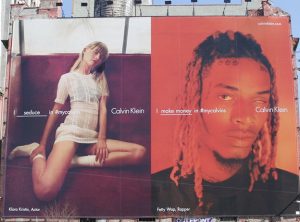Original Advertisement:

In a distasteful attempt to market underwear, Calvin Klein pushed gender equality backwards by several decades with this billboard advertisement in Soho, New York City. The male and female ads are problematic individually; however, when placed side by side, we can see an even more shocking juxtaposition that seems to explicitly reinforce 20th-century gender stereotypes.
In regards to the female ad, her claim “I seduce in #mycalvins” poses the blatantly sexist assumption that a woman’s priority should be to appeal sexually to men. The model, Klara Krisitin, is undoubtedly a hegemonic symbol of femininity, with white skin, a size 0 figure, and blonde hair. Moreover, it is important to acknowledge the sensual look on her face, in addition to her spread legs which merely tease darkness. By pairing the term “seduce” with a model who embodies unrealistic societal standards of beauty, women of other ethnicities or physical sizes are excluded from portrayals of attraction and sexuality. Here, we see Calvin Klein utilize Klara Kristin purely as a sex symbol, with the intention of persuading consumers that the only way to successfully achieve seduction is through purchasing the brand’s underwear.
On the other hand, rapper Fetty Wap is pictured with the line “I make money in #mycalvins”. Perhaps this ad would not have been so appalling had it been promoted singularly, however when exhibited as a billboard alongside Klara Kristin, it is easy to uncover the sexist implications. The pairing of “male” and “money-making” is problematic, as it reinforces the notion that men reign supreme as hard-working breadwinners, with women left as appeasers for their sexual desires. It is peculiar that Calvin Klein felt it was necessary to only showcase Fetty Wap’s face to sell underwear, whereas Kristin’s entire body was put on display in order to accomplish the same. This difference alone implies Calvin Klein’s flawed interpretation of gender: women must ‘sell’ themselves sexually to garner admiration, whereas a man’s ability to earn money is what warrants him respect. Ultimately, this notion suggests that Calvin Klein views a woman’s success as relational to her physical body, whereas this same standard does not apply to men.
Jammed Advertisement:

In order to point out the anti-feminist implications of this billboard and highlight its’ absurdity, I simply replaced words and inserted one symbol. For one, I changed Klara Kristin’s slogan from “I seduce in #mycalvins” to “I am sexually objectified in #mycalvins”. This alteration underscores Calvin Klein’s socially unjust attempt to reduce the female physical form to nothing more than a tool for catalyzing sales. My intention was to highlight the company’s transparent disregard towards female dignity, empowerment, or ability outside the realm of physical appearance, and how this sexual objectification of women plays a key role in gender discrimination. Furthermore, I incorporated a dollar sign between her ajar legs, as a means of exposing Calvin Klein’s misunderstanding of how females “make money”. While Fetty Wap simply has to bare his face to prove his prosperity, it would appear that the company believes that showcasing intimate body parts is the only way to sell products on female influencers.
Additionally, I manipulated the male advertisement slogan from “I make money in #mycalvins” to “I reinforce the patriarchy in #mycalvins”. By pairing a male figure with notions of monetary success alongside a woman reduced to her sexuality, Calvin Klein is implying that men dominate society through economic advantage. I desired to make irony of how this ad supports out-dated patriarchal conceptions, which wrongfully favour men in the context of the workplace and diminish the same opportunities for women. I undermined the company’s subtle attempt at maintaining oppressive gender roles by injecting these ‘new’ slogans, which aim to uncover the ad’s clear gender stratification and belief in stereotyping on the basis of sex.
Lastly, I changed the career labels of both Klara Kristin and Fetty Wap, from “actor” and “rapper”, to “sexy female” and “rich male”. Based on my understanding, the occupations of these two individuals was only slightly relevant in marketing the brand’s underwear, whereas their gender seemed to correlate most strongly with the messages applied to them. What was the point of granting Kristin the title of “actor” when clearly her most important feature was her sexuality? Likewise, why point to Fetty Wap’s musical background when all that matters is his economic status? To counter this, I created clearly sexist word pairs which reveal Calvin Klein’s misconstrued understanding of what it means to be a male versus female ambassador.
Link to original ad: http://www.adstasher.com/2016/03/thirdlove-ceo-heidi-zak-reacts-to.html